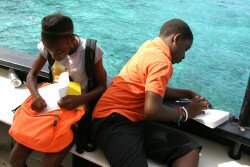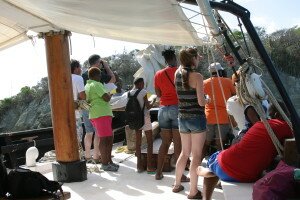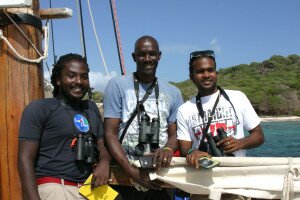
On July 22 to 23rd 2016, nineteen participants including fishermen, conservationists and tour operators from throughout the transboundary Grenadines took part in a two-day workshop on Union Island in St. Vincent and the Grenadines, which was organized by the non-profit organization Environmental Protection in the Caribbean (EPIC).
Participants had one day of classroom instruction from experts in their field during which they voluntarily signed a pledge establishing their commitment to the program. The following day they took part in a guided field trip to nearby seabird colonies to test out their new skills and binoculars. Afterwards, they practiced entering their data and learned about the procedure for being reimbursed for expenses incurred while conducting seabird surveys.
Workshop participants noted in their evaluations that they appreciated the lively discussions, building a regional support network, and learning to identify seabirds in the field. The identification quiz was particularly popular.
Natalia Collier, President of EPIC, commented “While conducting field studies for the book the Seabird Breeding Atlas of the Lesser Antilles, EPIC staff noted the global importance of many Grenadines seabird colonies, some of which had never before been surveyed. We identified this region as a priority for conservation action and are now working with local communities to monitor and protect these last refuges for nesting seabirds.”
Globally, seabirds are among the most threatened of bird groups, with 80% of species in decline and 90 -99% of seabirds lost from tropical islands. Prior to European contact, it is believed there were tens of millions of seabirds breeding in the Caribbean region, now just a fraction remains.
Seabirds have been forced to nest on the most remote islands by encroaching development, harvesting by humans, and predation by introduced animals like cats and rats. Because these nesting areas are so inaccessible, they are rarely visited. However, artisanal fishers, tour operators, and marine park staff periodically pass by the islands or camp out while working at sea. Through this citizen-science and stewardship project, known as the Grenadines Volunteer Patrol, residents are able to collect data on these crucial nesting areas, such as the number of nesting seabirds and signs of human impact.
Fishers and others who rely on the sea for their livelihood are familiar with seabirds, which often are used to indicate good fishing grounds and foretell weather events. However, they are concerned about the diminishing number of birds they are seeing and want to take action to protect their natural and cultural heritage. The Grenadines Volunteer Patrol presents an opportunity for them to contribute valuable data and act as stewards and advocates for often neglected wildlife refuges and the animals that depend upon them.
EPIC looks forward to building upon this successful experience and hosting similar workshops throughout the region. The organization would like to thank participants for their enthusiasm and dedication, and for taking time out of their schedules to make a real difference for conservation.
This project was made possible through funding from generous sponsors on the Global Giving donation platform and contributions from BirdsCaribbean. Partners included the Ministry of Agriculture, Forestry, and Fisheries of St. Vincent and the Grenadines.
Workshop instructors were instrumental to the success of the program. Dr. Will Mackin provided technical instruction regarding identification and survey methods, plus some great bird calls. Juliana Coffeyand Alison DeGraff shared their findings on local ecological knowledge of seabirds collected from Grenadines’ citizens and illustrated how seabirds have been associated with Grenadines’ cultural heritage for many centuries. This research is documented in their forthcoming identification guide“Birds of the Transboundary Grenadines.” Lystra Culzac-Wilson of the Science Initiative for Environmental Conservation and Education (SCIENCE) and graduate student Wayne Smart provided valuable perspectives on their experience studying seabirds in the region.
For more information or to get involved in protecting Caribbean seabirds contact EPIC at . Stay up to date on this initiative via Facebook at
https://www.facebook.com/epicislands
https://www.facebook.com/grenadinesbirds/
https://www.facebook.com/sciencesvg/



